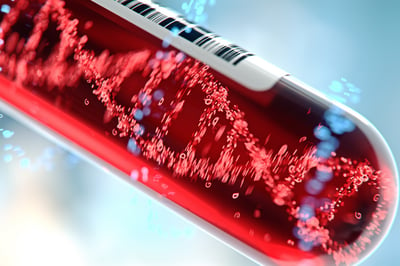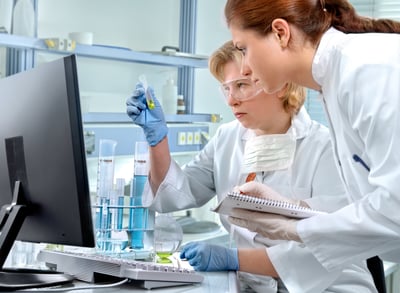FORCE's eXamining the Relevance of Articles for You (XRAY) program looks behind the headlines of cancer news to help you understand what the research means for you.
XRAY is a reliable source of hereditary cancer research-related news and information.
Learn more about the XRAY program
In portal: Ovarian Cancer, Categories Genetic Testing
Relevance: Medium-High


Quality of Writing: High


Article : Parents face challenges when deciding the best time to tell children that they may be at high risk for cancer
Relevance: Medium-High


Quality of Writing: High


Most relevant for: Parents who have an inherited gene mutation
When certain types of cancers run in families, genetic testing can determine whether the cause is hereditary. Genetic testing can help family members understand their cancer risk and make medical decisions to stay healthy. A test result can provide significant insight, but it also creates challenges for parents, because gene mutations that cause hereditary cancers can be passed from mothers and fathers to sons and daughters. People with these mutations must make difficult decisions about when to tell their children that they too may have inherited the mutation. (8/22/2017)
Read More
Relevance: High


Strength of Science: High


Research Timeline: Post Approval


Study : New cancer risk estimates for BRCA1/2 mutation carriers
Relevance: High


Strength of Science: High


Research Timeline: Post Approval


Most relevant for: Women with an inherited mutation in BRCA1 or BRCA2
Cancer risk estimates for BRCA1 and BRCA2 mutation carriers are important because they impact patient decision-making. Until now, almost all risk estimates for mutation carriers were based on results of retrospective studies that looked back on mutation carriers who had cancer. This new study is prospective—it followed almost 10,000 BRCA mutation carriers without cancer to see if or when they developed breast or ovarian cancer. The cancer risk estimates of this study may be more accurate because it followed mutation carriers who did not have cancer over time. (7/28/17)
Read More
Study : Angelina Jolie spoke out on BRCA testing: Did genetic testing increase?
Most relevant for: People interested in genetic testing for an inherited mutation
Angelina Jolie published an editorial in the New York Times in 2013 about her choice to have a double mastectomy after finding out she was positive for a BRCA1 mutation. Researchers from a recent study claim that her celebrity endorsement of BRCA testing may have missed its target audience (previvors), due to the increase in BRCA testing following publication of the editorial but a decrease in the number of mastectomies performed. However, the study failed to take into account that many women without breast cancer do not pursue mastectomy in the months following genetic testing. (1/4/17)
Read More
Relevance: Medium-High


Strength of Science: Medium


Research Timeline: Post Approval


Study : Rare mutations in PALB2, CHEK2, and ATM: how much do they increase cancer risk?
Relevance: Medium-High


Strength of Science: Medium


Research Timeline: Post Approval


Most relevant for: People who tested positive for one of the rare variants in CHEK2, ATM or PALB2 that are covered in this study
As multi-gene panel tests become more common, people are discovering they have mutations in genes that are not understood as well as BRCA. This can make it difficult to give patients accurate assessments of their cancer risk. For example, mutations in PALB2, CHEK2, and ATM are rare, but some specific changes in these genes are even less common. The goal of this international collaboration was to better understand the cancer risks of some very rare PALB2, CHEK2, and ATM mutations. The findings are relevant only to the specific mutations covered in this paper and do not apply to all people with mutations in PALB2, CHEK2, or ATM. (9/27/16)
Read More
Article : New York Times report demonstrates need for genetic counseling, but doesn’t give the whole story
Most relevant for: People diagnosed with breast cancer
A New York Times report discussed how genetic testing could provide “grim data” without guidance for patients. While this is a valid concern, this report does not sufficiently emphasize certain important issues regarding genetic testing, particularly the need for genetic counseling by a health care provider with expertise in genetics before and after genetic testing. (4/5/16)
Read More
Relevance: Medium


Strength of Science: Medium-High


Research Timeline: Post Approval


Study : What are the genetics underlying 12 different cancer types?
Relevance: Medium


Strength of Science: Medium-High


Research Timeline: Post Approval


Most relevant for: People diagnosed with cancer
As gene sequencing has become more affordable, researchers and health care providers are now looking for mutations in many genes beyond BRCA1, BRCA2 and others that are associated with known hereditary cancer syndromes. By sequencing thousands of genes rather than just one or two, researchers can better understand which inherited mutations affect cancer risk. In this study, researchers sequenced thousands of genes in patients with one of 12 cancers, including breast, and catalogued which gene mutations are most commonly found in each cancer. (03/01/16)
Read More
Relevance: Medium


Strength of Science: Medium-High


Research Timeline: Human Research


Study : How many children with cancer have mutations in genes that increase cancer risk?
Relevance: Medium


Strength of Science: Medium-High


Research Timeline: Human Research


Most relevant for: Survivors of childhood cancer and people with a family history of relatives diagnosed with childhood cancers
Many genes are associated with increased cancer risk in adults, but it is unclear how common these mutations are in children with cancer. This study found that about 9% of children with cancer carry mutations in a gene that is known to increase cancer risk. Over half of the mutations were in the TP53 gene, which is associated with increased cancer risk at a young age and increased risk of breast cancer in adults. (12/15/2015)
Read More
Relevance: Low


Quality of Writing: Low


Article : What “The Truth About Cancer” got wrong about BRCA mutations and cancer
Relevance: Low


Quality of Writing: Low


Most relevant for: Because this video is full of medical misinformation, it is not relevant for anyone making healthcare decisions
A website called thetruthaboutcancer.com, created a 9-part docu-series titled “The Truth About Cancer: A Global Quest” (TACGQ). The video states that Angelina Jolie’s decision to remove her breasts was one made out of fear; one commentator states that her decision was “barbaric." This video contains a lot of dangerous misinformation about BRCA mutations and inherited cancer. FORCE XRAYS provides the following point-by-point analysis on "The Truth About Cancer." (11/10/2015)
Read More
Relevance: Medium-High


Strength of Science: Medium


Study : Impact of familial breast cancer risk on young girls
Relevance: Medium-High


Strength of Science: Medium


Most relevant for: Young women and girls from high-risk breast cancer families
Does growing up in a family that is at high risk for breast cancer affect young girls? Recent research found girls from families with BRCA mutations and/or a strong family history of cancer to be as well adjusted as peers of the same age. The one difference was that girls from families facing breast cancer risk had more stress related to breast cancer than their peers. While these findings are reassuring, parents know their children best, and they should ask for help if they believe their daughters are not coping well. (11/03/2015)
Read More